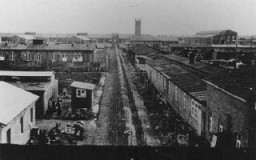You searched for: London%20College%20of%20FashionDiploma%20in%20Public%20Administration%E3%80%90%E4%BB%BF%E8%AF%81%E5%BE%AECXFK69%E3%80%9172PuU
<< Previous | Displaying results 51-60 of 188 for "London%20College%20of%20FashionDiploma%20in%20Public%20Administration%E3%80%90%E4%BB%BF%E8%AF%81%E5%BE%AECXFK69%E3%80%9172PuU" | Next >>
-
The Times, August 17, 1921
ArtifactIn this London Times article, reporter Philip Graves compared passages from Maurice Joly’s Dialogue in Hell Between Machiavelli and Montesquieu (1864) side-by-side with the Protocols of the Elders of Zion in order to prove that the Protocols was plagiarized. Other investigations revealed that one chapter of a Prussian novel, Hermann Goedsche’s Biarritz (1868), also “inspired” the Protocols. Times (London), August 17, 1921.
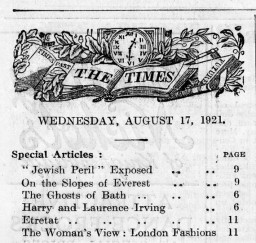
-
The Times, August 17, 1921
ArtifactIn this London Times article, reporter Philip Graves compared passages from Maurice Joly’s Dialogue in Hell Between Machiavelli and Montesquieu (1864) side-by-side with the Protocols of the Elders of Zion in order to prove that the Protocols was plagiarized. Other investigations revealed that one chapter of a Prussian novel, Hermann Goedsche’s Biarritz (1868), also “inspired” the Protocols. Times (London), August 17, 1921.
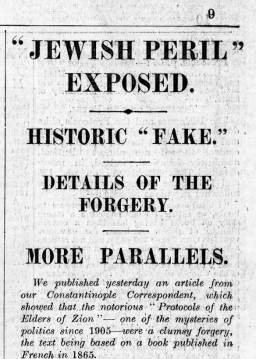
-
The Times, August 17, 1921
ArtifactIn this London Times article, reporter Philip Graves compared passages from Maurice Joly’s Dialogue in Hell Between Machiavelli and Montesquieu (1864) side-by-side with the Protocols of the Elders of Zion in order to prove that the Protocols was plagiarized. Other investigations revealed that one chapter of a Prussian novel, Hermann Goedsche’s Biarritz (1868), also “inspired” the Protocols. Times (London), August 17, 1921.
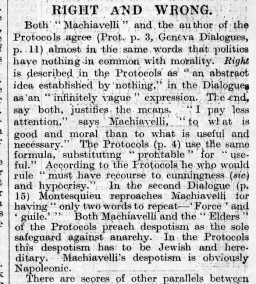
-
The Times, August 17, 1921
ArtifactIn this London Times article, reporter Philip Graves compared passages from Maurice Joly’s Dialogue in Hell Between Machiavelli and Montesquieu (1864) side-by-side with the Protocols of the Elders of Zion in order to prove that the Protocols was plagiarized. Other investigations revealed that one chapter of a Prussian novel, Hermann Goedsche’s Biarritz (1868), also “inspired” the Protocols. Times (London), August 17, 1921.
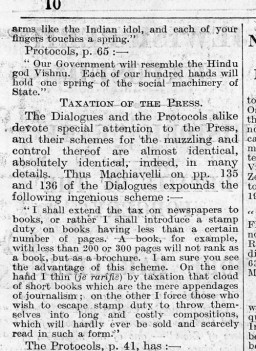
-
The Times, August 17, 1921
ArtifactIn this London Times article, reporter Philip Graves compared passages from Maurice Joly’s Dialogue in Hell Between Machiavelli and Montesquieu (1864) side-by-side with the Protocols of the Elders of Zion in order to prove that the Protocols was plagiarized. Other investigations revealed that one chapter of a Prussian novel, Hermann Goedsche’s Biarritz (1868), also “inspired” the Protocols. Times (London), August 17, 1921.
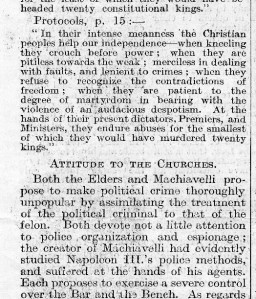
-
Jan Karski
ArticleAn underground courier for the Polish government-in-exile, Jan Karski was one of the first to deliver eyewitness accounts of the Holocaust to Allied leaders.
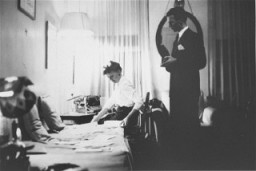
-
Notice of Gregor Wohlfahrt's execution
DocumentAuthorities in Berlin, Germany, sent this notice to Barbara Wohlfahrt, informing her of her husband Gregor's execution on the morning of December 7, 1939. Although he was physically unfit to serve in the armed forces, the Nazis tried Wohlfahrt for his religious opposition to military service. As a Jehovah's Witness, Wohlfahrt believed that military service violated the biblical commandment not to kill. On November 8, 1939, a military court condemned Wohlfahrt to beheading, a sentence carried out one month…
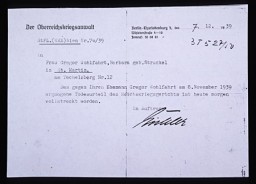
-
Reichstag Fire Decree
ArticleThe Reichstag Fire Decree of February 1933 restricted individual freedoms, and allowed Hitler's government to overrule state and local laws and overthrow state and local governments.
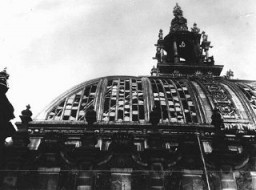
-
The Weimar Republic
ArticleThe Weimar Republic was a liberal democratic republic founded in Germany in the aftermath of WWI. Learn about the era’s political and economic crises and social trends.
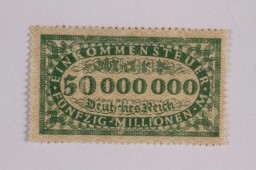
-
Neuengamme
ArticleIn 1938, the Nazis established Neuengamme concentration camp. Learn more about camp conditions, medical experiments, and liberation.
